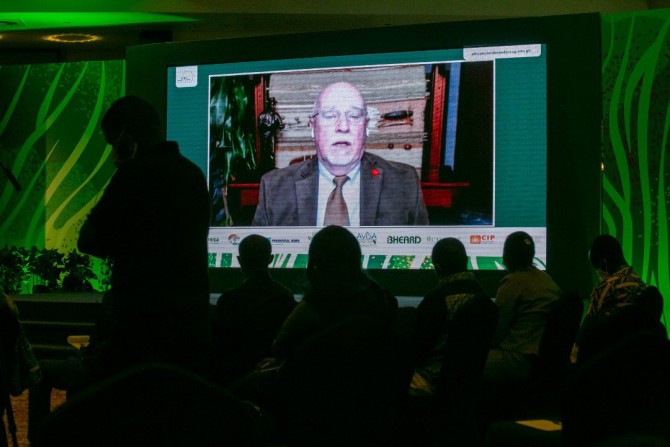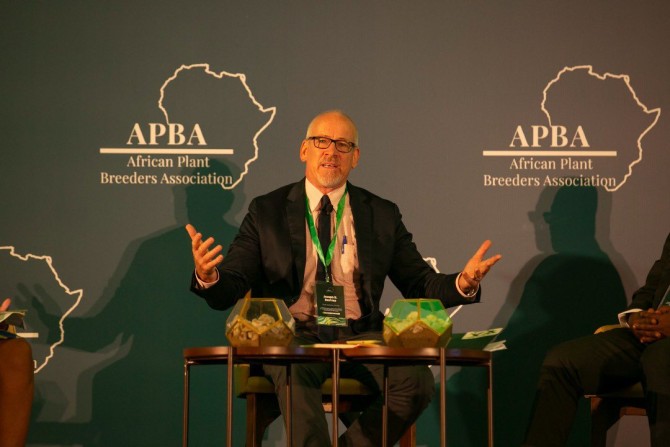News directly from Cornell's colleges and centers
Cornell alumni honored for plant breeding work in Africa
By Matt Hayes
Two Cornell alumni with deep ties to plant breeding efforts in Africa were recognized for outstanding work building capacity to improve food security on the continent.
Ronnie Coffman, Ph.D. ’71 and Joe DeVries, Ph.D. ’95 received the Distinguished Award for Meritorious Service from the African Plant Breeders Association (APBA) Oct. 26 at the APBA conference in Rwanda.
“I commend Dr. Joe DeVries and Dr. Ronnie Coffman for their selfless service to plant breeding capacity development in Africa,” said Eric Danquah, president of the APBA. Danquah is director of the West Africa Centre for Crop Improvement (WACCI) and a visiting scientist in Cornell’s Department of Global Development.
“From the visionary and catalytic work of Dr. Coffman and Dr. DeVries emerged a vigorous and sustainable model to train African plant scientists on African crops right in Africa,” Danquah said.
The award honors Coffman and DeVries for their achievements fostering the establishment of African Centre for Crop Improvement (ACCI) in 2001 and WACCI in 2007. ACCI, based in South Africa, and WACCI, based at the University of Ghana, Legon, have each emerged as African powerhouses for the training of elite plant breeders.
Coffman and DeVries partnered on the concept of an advanced training program dedicated to the plant sciences that could compete with graduate programs found in the U.S. and Europe. Inspired by a lecture given at a global plant breeding conference by Danquah, a Ghana-born plant breeder trained at Cambridge University, the scientists collaborated on the prospects of an Africa-based program attractive to the most talented African scientists. Data showed that African-born scientists who trained in the U.S. and Europe often remained after graduating, depriving Africa of scientists with the advanced training needed to breed improved local crops essential to food security in Africa. Coffman and DeVries, working together with Danquah and others, aimed to coalesce funding necessary to attract top African scientists to train in Africa.
“The dream at that time was to build a competitive plant science program in Africa, for Africa,” Danquah said. “Through our partnership with Cornell, that dream has become reality.”
Backed by funding from the Alliance for a Green Revolution (AGRA) and support from Cornell, Danquah launched WACCI at the University of Ghana, Legon in 2007. Since its inception, the program has graduated 95 doctoral students and 30 students with advanced master’s degrees in plant science from 19 countries in Africa. Dozens of students are currently training in the program and conducting research into crops specific to Africa. The graduates have released over 160 improved varieties of staple crops in six countries, published over 200 articles in high impact journals and attracted over $35 million in funding to their research institutions since graduation.
Coffman is a professor of global development and international professor of plant breeding and genetics in the College of Agriculture and Life Sciences at Cornell. He has led numerous agricultural projects around the world and in Africa. His work has spanned a range of crops critical to African food security, including cassava, banana, rice, and wheat. He currently serves as principal investigator for Next Generation Cassava, a multidisciplinary research project optimizing Africa-based cassava breeding institutions. Along with his crop improvement research focus, Coffman has been a world-leader in promoting gender equity in agriculture.
DeVries is president of Seed Systems Group, an Africa-based team of seed systems specialists working to enhance the delivery of improved seeds to smallholder farmers. The group focuses on more than a dozen African countries that historically have not benefitted from agricultural development efforts.
DeVries earned his doctorate in plant breeding and genetics from Cornell with a focus on maize improvement in Africa. After graduating in 1995 he joined The Rockefeller Foundation to improve sustainable agricultural development efforts with an emphasis on hunger relief efforts and seed systems. In 2006 he co-founded AGRA, and for more than a decade served as vice president for program development. In that role he supported efforts of ACCI at the University of Kwa-Zulu Natal, and establishment of WACCI. In 2019 he founded SSG to focus on developing sustainable seed systems in the least developed countries in Africa.
Media Contact
Get Cornell news delivered right to your inbox.
Subscribe


